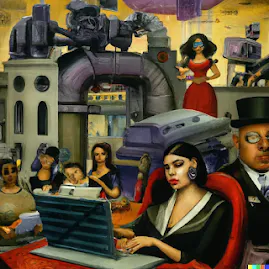The Higher Education Inquirer (HEI) champions the rights of academic workers and critically examines the changing landscape of work in higher education, connecting it to broader economic trends
Focus on Adjunct Faculty and Labor Conditions:
HEI frequently highlights the precarious working conditions of adjunct faculty (grad assistants, contingent instructors, and researchers) who make up a significant portion of the teaching workforce in higher education, especially in online programs. It draws attention to issues such as low pay, lack of job security, limited benefits, and the increasing reliance on contingent labor in academia. This coverage exposes the exploitation of academic workers and its impact on educational quality.
Connection Between Education and Employment:
The Higher Education Inquirer explores the link between higher education and the job market, questioning whether certain programs adequately prepare students for gainful employment. It raises concerns about "hypercredentialism," where degrees become mere "tickets to be punched" without necessarily leading to meaningful work or sufficient income to repay student loans. HEI investigates the job placement rates of graduates from different types of institutions, particularly for-profit colleges and online programs, and highlights instances where these rates may be misleading or inflated.
Impact of Technology on Work:
The Higher Education Inquirer examines how technology is changing the nature of work, both within and outside of higher education. It discusses the rise of the "gig economy" and the increasing prevalence of precarious employment in the tech sector and related industries. The publication explores the potential for automation and artificial intelligence to displace human workers, raising concerns about job security and the future of work. This technological shift is often driven by corporate interests, which HEI critically examines.
Critique of Corporate Influence and Profit-Driven Models:
HEI is critical of the increasing influence of corporations and profit-driven models in higher education and the broader economy. We argue that the pursuit of profit often comes at the expense of workers' rights, job quality, and the overall well-being of individuals. This critique extends to the "tech bro" culture and its emphasis on maximizing profits and technological advancement, often without regard for the social and economic consequences.
Advocacy for Workers and a More Equitable Economy:
The Higher Education Inquirer advocates for fair labor practices, decent wages, and greater economic equality. It supports efforts to organize workers and challenge exploitative practices in various industries, including higher education. The publication promotes a more human-centered approach to work, emphasizing the importance of meaningful employment, job security, and a balance between work and life.
The Higher Education Inquirer provides significant coverage of labor strikes, particularly those within the higher education sector. HEI offers detailed accounts of specific labor strikes, providing context, timelines, and analysis of the issues at stake. For example, they've covered:
The 2023 Rutgers University strike.
The August 2024 strike by UAW Region 9 workers at Cornell University.
Focus on the Underlying Issues: The Higher Education Inquirer goes beyond simply reporting on the events of a strike. They delve into the root causes, such as: low wages and inadequate benefits for academic workers (including graduate students, adjuncts, and other staff), job insecurity and the increasing reliance on contingent labor, issues related to fair contracts, bargaining in good faith, and protection of union activity, and the impact of university policies and management decisions on workers' rights and well-being.
Highlighting the Voices of Workers:
HEI often includes the perspectives and experiences of the striking workers themselves, giving them a platform to share their stories and explain their reasons for striking. This humanizes the issues and provides a more personal understanding of the impact of labor disputes.
Connecting Strikes to Broader Trends
The Higher Education Inquirer connects individual strikes to larger trends in higher education and the economy, such as: The increasing corporatization of universities. The rise of precarious employment and the gig economy. The growing gap between executive compensation and worker wages. The impact of austerity measures and budget cuts on public institutions.
Advocacy for Workers' Rights and Collective Action
HEI supports the right of workers to organize and strike for better working conditions. They frame labor strikes as a legitimate and necessary tool for workers to exercise their power and demand fair treatment.
The Higher Education Inquirer views the nature of work as an integral part of the larger discussion about higher education. It recognizes that education is often linked to employment outcomes and that the quality of work available to graduates is a crucial factor in determining the value of a degree. By examining the working conditions of academic staff, the connection between education and employment, and the broader impact of technology and corporate influence on the labor market, the Higher Education Inquirer provides a comprehensive and critical perspective on the nature of work in the 21st century.

No comments:
Post a Comment